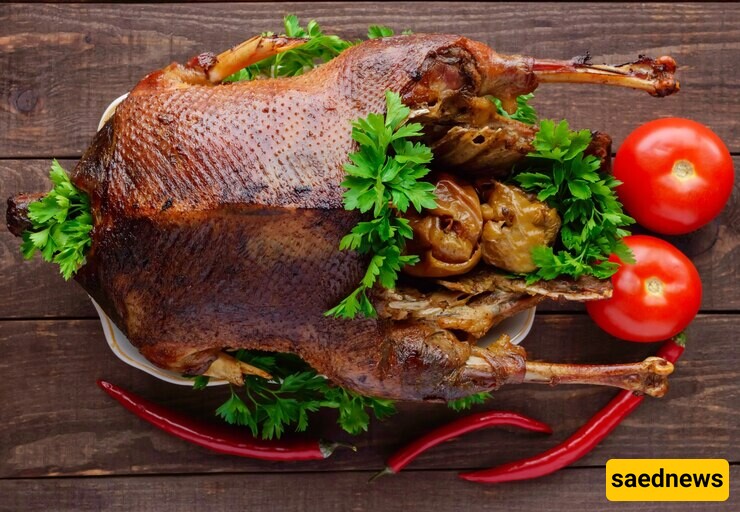SAEDNEWS: Duck is a type of poultry used in cooking, often fried or cooked. Both its meat and eggs are consumed, with duck eggs used to make salted duck eggs. "Duck meat" typically refers to the breast and thigh, with thigh meat being darker and fattier than breast meat.


Historically, the consumption of duck meat dates back to around 3000 BC, according to archaeological discoveries through paintings and engravings found on walls and caves. Wild ducks were trapped by humans using live traps and kept in enclosed marshlands, being fed by hand with wheat, barley, and grape pomace. Evidence shows that ducks were domesticated after chickens and geese, and their meat was primarily used during feasts and festivals in ancient Rome. Their feathers were used for insulating clothes and mattresses. Since the 12th century, domestic ducks have been raised more extensively, although their economic impact was limited because wild ducks were widely hunted by hunters.
The hunting of wild ducks from the 15th to the 19th century was widespread in England, the Baltic countries, and Russia, but as populations in cities increased and demand for duck meat grew, domesticated ducks began to be bred and improved.
The domestication of ducks in China and the Far East dates back about 4000 years, and from 1368-1644, the Pekin duck breed became well-known. The Chinese used ducks in their rice fields to control crabs, locusts, and pests, and duck farming has always been associated with rice cultivation in Asia, playing a significant role in the income of farmers.
Prevention of Cancer Cell Formation: Duck meat contains high levels of various antioxidants that help destroy free radicals in cells, preventing the formation of cancer cells.
Supporting Overall Health: Duck meat contains various vitamins, including B6 and B12, which are beneficial for strengthening the nervous system, increasing metabolism, and stimulating appetite. These vitamins help maintain a healthy, energetic body. A deficiency in these vitamins can lead to anemia, nervous weakness, memory loss, lethargy, headaches, and more. Additionally, vitamin B12 in duck meat supports the health of skin, nails, and hair, as well as fat metabolism.
Relieving Shortness of Breath: Duck meat is considered beneficial for individuals suffering from shortness of breath due to its properties that help alleviate this condition.
Anemia Treatment: Duck meat, being rich in minerals, particularly iron and zinc, helps treat anemia. Therefore, consuming duck meat is beneficial for those with anemia and pregnant women. Duck liver, wings, and thighs have high blood-building properties and are recommended for those suffering from anemia.
Prevention of Stomach Ulcers and False Appetite: Duck meat, containing various vitamins and proteins, provides the body with daily energy. Since protein is slow to digest, it helps the stomach feel full for longer, preventing stomach ulcers and false hunger.
Eye Health: Compared to other meats, duck meat contains 3 to 10 times more vitamin A, which helps maintain eye health and mucous membranes in the mouth. It also prevents viral attacks on the body.
Facilitating Digestion: Duck meat contains vitamin B5 (pantothenic acid), which helps increase the speed of digestion by aiding coenzyme A. By consuming duck meat in appropriate amounts, the body can meet its vitamin B5 needs and enhance nutrient absorption.
Weight Gain: Duck wings are rich in fat and nutritional value, making them useful for underweight individuals seeking to gain weight. They have fattening properties.
Relieving Stomach Gas: Duck meat contains vitamin B3 (niacin), which has anti-bloating properties and helps relieve stomach gas. It also increases appetite and plays a vital role in fat metabolism and lowering blood cholesterol levels.
Supporting Kidney Health: Duck meat is beneficial for maintaining kidney health. It is recommended for individuals with kidney-related issues, and they can benefit from its health advantages. Duck fat is also said to have therapeutic properties for the kidneys, but it is not recommended for those with high cholesterol.
Reducing Bad Cholesterol: As mentioned, duck meat contains niacin, which helps reduce LDL plasma levels. Niacin also supports genetic processes, and insufficient intake can damage DNA. Moreover, niacin helps stabilize blood sugar and regulate insulin metabolism, making duck meat beneficial for people with diabetes.
Controlling Heart Palpitations: Excessive heart palpitations may cause various cardiovascular problems, which can be controlled by consuming duck meat appropriately.
Treating Cough and Hoarseness: The tissue structure of duck meat helps relieve hoarseness when consumed. It is also effective in treating coughs and alleviating chest dryness.
Duck meat, being a rich source of vitamins and minerals, acts similarly to a medicine: while consuming it in moderation guarantees health benefits, excessive intake can lead to various health issues such as liver, kidney, and digestive problems. Some of the potential side effects of excessive duck meat consumption include:
Due to its high fat content, consuming too much duck meat can cause blood vessel blockage and lead to severe cardiovascular issues.
The high cholesterol content in duck meat can raise blood cholesterol levels and increase fat in the bloodstream.
Obesity has become a widespread issue, and consuming excess duck meat, due to its high fat content, can lead to localized obesity, which in turn is the root cause of many diseases.

